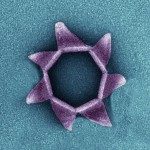Lien vers Pubmed [PMID] – 25370836
Lien vers HAL – hal-01329875
Lien DOI – 10.1186/s13059-014-0505-0
Genome Biology, 2014, 15 (11), pp.505. ⟨10.1186/s13059-014-0505-0⟩
Background: The genus Legionella comprises over 60 species. However, L. pneumophila and L. longbeachae alone cause over 95% of Legionnaires’ disease. To identify the genetic bases underlying the different capacities to cause disease we sequenced and compared the genomes of L. micdadei, L. hackeliae and L. fallonii (LLAP10), which are all rarely isolated from humans. Results: We show that these Legionella species possess different virulence capacities in amoeba and macrophages, correlating with their occurrence in humans. Our comparative analysis of 11 Legionella genomes belonging to five species reveals highly heterogeneous genome content with over 60% representing species-specific genes; these comprise a complete prophage in L. micdadei, the first ever identified in a Legionella genome. Mobile elements are abundant in Legionella genomes; many encode type IV secretion systems for conjugative transfer, pointing to their importance for adaptation of the genus. The Dot/Icm secretion system is conserved, although the core set of substrates is small, as only 24 out of over 300 described Dot/Icm effector genes are present in all Legionella species. We also identified new eukaryotic motifs including thaumatin, synaptobrevin or clathrin/coatomer adaptine like domains. Conclusions: Legionella genomes are highly dynamic due to a large mobilome mainly comprising type IV secretion systems, while a minority of core substrates is shared among the diverse species. Eukaryotic like proteins and motifs remain a hallmark of the genus Legionella. Key factors such as proteins involved in oxygen binding, iron storage, host membrane transport and certain Dot/Icm substrates are specific features of disease-related strains.







